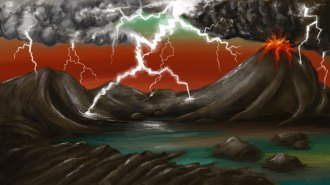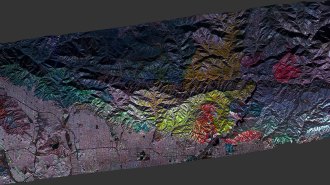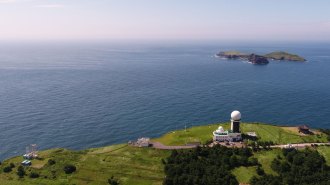Earth
Sign up for our newsletter
We summarize the week's scientific breakthroughs every Thursday.
-
 Earth
EarthPhosphorus for Earth’s earliest life may have been forged by lightning
Lightning strikes can supply one of life’s essential elements, long thought to be delivered by meteorites billions of years ago.
-
 Archaeology
ArchaeologyA tour of ‘Four Lost Cities’ reveals modern ties to ancient people
In the book 'Four Lost Cities,' author Annalee Newitz uses cities of the past to show what might happen to cities in the future.
-
 Environment
EnvironmentThe world wasted nearly 1 billion metric tons of food in 2019
A new United Nations global food waste report shows where waste can be reduced, which would decrease hunger and greenhouse gas emissions.
-
 Animals
AnimalsA year after Australia’s wildfires, extinction threatens hundreds of species
As experts piece together a fuller picture of the scale of damage to wildlife, more than 500 species may need to be listed as endangered.
-
 Earth
EarthTo understand how ‘night-shining’ clouds form, scientists made one themselves
A rocket, a bathtub’s worth of water and a high-altitude explosion reveal how water vapor cools the air to form shiny ice-crystal clouds.
-
 Environment
Environment‘Green’ burials are slowly gaining ground among environmentalists
Researchers asked older environmental activists what they planned to do with their bodies after death. Many were unaware of “green” burial options.
-
 Paleontology
PaleontologyClimate change helped some dinosaurs migrate to Greenland
A drop in CO2 levels helped massive plant eaters called sauropodomorphs trek from South America to Greenland 214 million years ago, says a new study.
-
 Earth
EarthColor-coded radar maps reveal a patchwork of California wildfire destruction
A composite made up of fine-scale vegetation maps from different years lets researchers track the story of plant loss and regrowth around Los Angeles.
By Jack J. Lee -
 Earth
EarthA magnetic field reversal 42,000 years ago may have contributed to mass extinctions
The weakening of Earth's magnetic field beginning around 42,000 years ago correlates with a cascade of environmental crises, scientists say.
-
 Plants
PlantsModified genes can distort wild cotton’s interactions with insects
In a Yucatan nature park, engineered genes influence nectar production, affecting ants’ and maybe pollinators’ attraction to the wild cotton plants.
-
 Earth
EarthFin whale songs can reveal hidden features of the ocean floor
Fin whale calls can penetrate into Earth’s crust, offering scientists a new way to study the properties of the ocean floor.
-
 Earth
EarthA drop in CFC emissions puts the hole in the ozone layer back on track to closing
After a recent bump in illicit CFC-11 pollution, emissions of the ozone-destroying chemical are back down to pre-2013 levels.